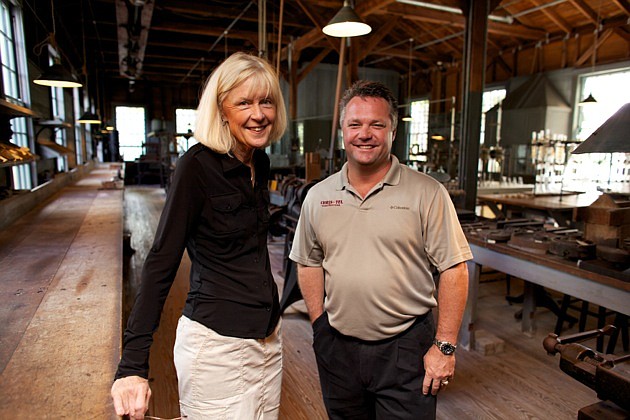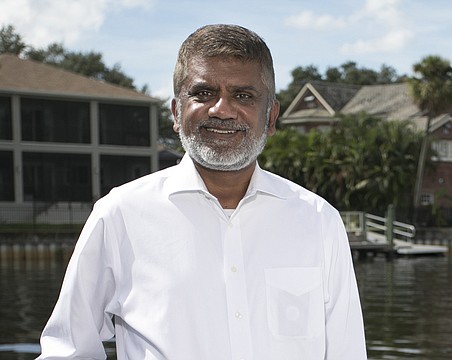REVIEW SUMMARY
Company. Chris-Tel Construction
Industry. Construction
Key. Find a niche and do it well.
When a construction crew started renovating the Edison & Ford Winter Estates in Fort Myers, Howard Wheeler Sr. made every worker turn in his hammer.
Not surprisingly, there was a bit of grumbling among the crew. After all, a construction worker without a hammer is like a butcher without a knife.
But the elder Wheeler, 69, knew what he was doing. Any worker who instinctively used his hammer would cause the fragile plaster inside the historic buildings to crack. Instead, they were instructed to use drills.
Eventually, the construction workers got their hammers back when Wheeler was sure they weren't going to use them improperly, but it's the kind of knowledge and understanding of bygone construction methods that is slowly fading.
Wheeler's son, Howard Wheeler Jr., 44, realized that unless he did something to preserve and pass on the knowledge of his father and others of his generation, it was going to be lost, and older buildings in Florida wouldn't be properly renovated.
So Wheeler Jr., the president of Chris-Tel Construction in Fort Myers, established a nonprofit organization seven years ago to train craftsmen in historic renovation work. “Nobody down here knew how,” Wheeler says. “That knowledge was going to die with the older people,” he says.
With a crew of experienced craftsmen, Chris-Tel landed jobs renovating historic structures along the Gulf Coast. It was a niche market that remained active and helped the company survive the devastating downturn that felled so many competitors.
What's more, Chris-Tel's reputation for creative construction and top-notch detail work earned it accolades from prestigious organizations such as the National Trust for Historic Preservation. That kind of publicity earned it more jobs, both renovations and new construction.
But the nonprofit organization Wheeler formed to train workers has also become a vehicle for landing other jobs. It turns out that municipalities increasingly are awarding rehabilitation and renovation work to nonprofit organizations, which in turn hire and oversee construction work.
So Wheeler's nonprofit can now bid for municipal projects that would have been off-limits to a for-profit firm like Chris-Tel. “This opened up an avenue that would be shut,” he says.
It's the kind of creative thinking that's completely in character for a firm that specializes in tackling unique projects. Wheeler specializes in creative problem solving to renovate old buildings, an entrepreneurial nimbleness that has served him well.
Fort Myers family
Wheeler's family has deep roots in Fort Myers, where his grandfather's firm, Wheeler Brothers, built an addition to Thomas Edison's winter home here.
Wheeler Jr. started working for his father in 1984 and eventually started Chris-Tel in 1989. “When I first started, we did high-end residential and commercial renovations,” says Wheeler.
What Wheeler enjoyed the most was high-end detail work, but he found it challenging to find well-trained craftsmen. This problem became even more difficult during the boom year of the early to mid-2000s.
Wheeler's quest for craftsmen led him to an encounter with Brian Rand, president of a firm in Jacksonville called Professional Restoration. Rand was having the same labor challenges and together they formed Rehabilitation Education and Preservation (REAP) in 2005, a nonprofit that would pay to train employees in historic restoration work. “I invested $20,000,” says Wheeler.
Edison State College provided the academic materials and classroom instruction during evening classes. Employees who successfully passed the class and put in 2,000 hours of on-the-job training would receive a certificate. As an incentive to attend night classes, Wheeler offered $1-an-hour bump in pay for those who participated.
As it turns out, the education program motivated employees and gave them extra incentive to perform well on the job site. “We built better people,” Wheeler says. “They cared. They were on time and respectful of people.”
These well-trained, motivated employees reflected positively on Chris-Tel. “They're selling our company in the community.”
Chris Pendleton, president and CEO of the Edison & Ford Winter Estates, says Chris-Tel's employees were never late and never loitered on the job. She says Wheeler has a knack for finding the best craftsmen for each job.
Pendleton says Wheeler managed the project through challenges ranging from putting on a new roof during the 2005 hurricanes to how to hide the porta-potties from the 200,000 visitors a year who trooped through the property. “We became friends because it's the only way you're going to make it through a project like this,” says Pendleton.
Nonprofit payoff
Wheeler's crew of experienced craftsmen now get an edge over the competition when it comes to bidding for historical renovations. “Does anybody else have a certification in historic restoration from an established college?” Wheeler asks when bidding for work.
For example, to replace the windows on the Edison & Ford Winter Estates, Chris-Tel created its own mill shop because no one makes windows like they did in the 1920s. But Wheeler had the knowledge, making special blades to cut the wood and using glazing points to hold the glass. “My grandfather made windows and doors and my dad showed the employees how,” he says.
Chris-Tel also has improvised with new technology to suit its needs.
For example, to fix the foundation of the Edison estate's botanical laboratory, Chris-Tel workers devised an elaborate mechanical creeper and plywood roadway so it could shuttle cement and other supplies to workers below the building.
And in 2003, the company moved a 5,232-square-foot, three-story historic Fort Myers brick house 200 yards using 44 carriages on wheels. “We moved a 2 million-pound house,” Wheeler says, adding that he let then-Mayor Jim Humphrey drive the massive structure.
Wheeler declines to disclose revenues or other financial data about Chris-Tel. While revenues fell about 30% from the peak years, Chris-Tel is one of the survivors of the brutal downturn that wiped out many competitors.
Wheeler attributes the firm's survival to the fact that it didn't expand beyond its abilities like competitors. “We never took on more work than we had,” he says.
What's more, the publicity that Chris-Tel earned from projects such as the Edison & Ford Winter Estate has been invaluable. More than 200,000 visitors tour the estate each year and in 2009 it won the top award from the National Trust for Historic Preservation.
While municipal budgets have been shrinking, Wheeler says some government-related buildings need to be renovated because they're still being used. One example is old schools, such as Tice Elementary School, which he attended as a child.
In some cases, municipalities are delegating renovation work to nonprofits. For example, the city of Fort Myers recently sought nonprofits to rehabilitate low-income homes. Wheeler says his nonprofit, REAP, could be an organization that could shepherd such projects. “This is the first time we've proposed this in this format,” he says.






